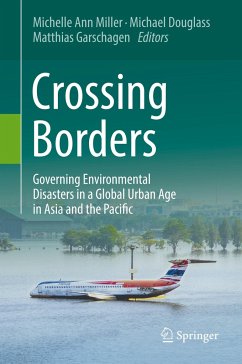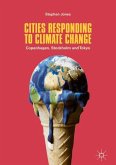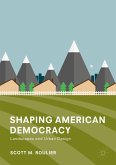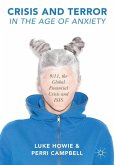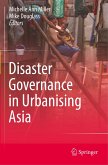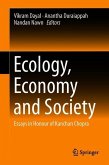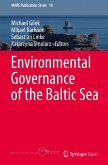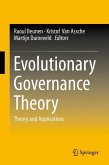Crossing Borders
Governing Environmental Disasters in a Global Urban Age in Asia and the Pacific
Herausgegeben:Miller, Michelle Ann; Douglass, Michael; Garschagen, Matthias
Crossing Borders
Governing Environmental Disasters in a Global Urban Age in Asia and the Pacific
Herausgegeben:Miller, Michelle Ann; Douglass, Michael; Garschagen, Matthias
- Gebundenes Buch
- Merkliste
- Auf die Merkliste
- Bewerten Bewerten
- Teilen
- Produkt teilen
- Produkterinnerung
- Produkterinnerung
This multidisciplinary book examines the diverse ways in which environmental disasters with compounding impacts are being governed as they traverse sovereign territories across rapidly urbanising societies in Asia and the Pacific. Combining theoretical advances with contextually rich studies, the book examines efforts to tackle the complexities of cross-border environmental governance. In an urban age in which disasters are not easily contained within neatly delineated jurisdictions, both in terms of their interconnected causalities and their cascading effects, governance structures and…mehr
Andere Kunden interessierten sich auch für
![Cities Responding to Climate Change Cities Responding to Climate Change]() Stephen JonesCities Responding to Climate Change82,99 €
Stephen JonesCities Responding to Climate Change82,99 €![Shaping American Democracy Shaping American Democracy]() Scott M. RoulierShaping American Democracy90,99 €
Scott M. RoulierShaping American Democracy90,99 €![Crisis and Terror in the Age of Anxiety Crisis and Terror in the Age of Anxiety]() Luke HowieCrisis and Terror in the Age of Anxiety67,99 €
Luke HowieCrisis and Terror in the Age of Anxiety67,99 €![Disaster Governance in Urbanising Asia Disaster Governance in Urbanising Asia]() Disaster Governance in Urbanising Asia38,99 €
Disaster Governance in Urbanising Asia38,99 €![Ecology, Economy and Society Ecology, Economy and Society]() Ecology, Economy and Society90,99 €
Ecology, Economy and Society90,99 €![Environmental Governance of the Baltic Sea Environmental Governance of the Baltic Sea]() Environmental Governance of the Baltic Sea38,99 €
Environmental Governance of the Baltic Sea38,99 €![Evolutionary Governance Theory Evolutionary Governance Theory]() Evolutionary Governance Theory75,99 €
Evolutionary Governance Theory75,99 €-
-
-
This multidisciplinary book examines the diverse ways in which environmental disasters with compounding impacts are being governed as they traverse sovereign territories across rapidly urbanising societies in Asia and the Pacific. Combining theoretical advances with contextually rich studies, the book examines efforts to tackle the complexities of cross-border environmental governance. In an urban age in which disasters are not easily contained within neatly delineated jurisdictions, both in terms of their interconnected causalities and their cascading effects, governance structures and mechanisms are faced with major challenges related to cooperation, collaboration and information sharing. This book helps bridge the gap between theory and practice by offering fresh insights and contrasting explanations for variations in transboundary disaster governance regimes among urbanising populations in the Asia-Pacific.
Produktdetails
- Produktdetails
- Verlag: Springer / Springer Nature Singapore / Springer, Berlin
- Artikelnr. des Verlages: 978-981-10-6125-7
- 1st ed. 2018
- Seitenzahl: 308
- Erscheinungstermin: 20. Dezember 2017
- Englisch
- Abmessung: 241mm x 160mm x 23mm
- Gewicht: 572g
- ISBN-13: 9789811061257
- ISBN-10: 9811061254
- Artikelnr.: 48654817
- Herstellerkennzeichnung Die Herstellerinformationen sind derzeit nicht verfügbar.
- Verlag: Springer / Springer Nature Singapore / Springer, Berlin
- Artikelnr. des Verlages: 978-981-10-6125-7
- 1st ed. 2018
- Seitenzahl: 308
- Erscheinungstermin: 20. Dezember 2017
- Englisch
- Abmessung: 241mm x 160mm x 23mm
- Gewicht: 572g
- ISBN-13: 9789811061257
- ISBN-10: 9811061254
- Artikelnr.: 48654817
- Herstellerkennzeichnung Die Herstellerinformationen sind derzeit nicht verfügbar.
Michelle Ann Miller is a Senior Research Fellow at the Asia Research Institute, National University of Singapore. Trained in political science, her research focuses on intersections between urban and regional governance in the context of human conflict and environmental change. She leads the Disaster Governance theme of the Asian Urbanisms Cluster at ARI. Her interdisciplinary publications speak to contemporary theoretical debates and key policy issues in environmental disaster governance, decentralisation, urban change, and citizenship and belonging. A reoccurring concern throughout her work is with the policy potential and lived experience of decentralisation in generating more inclusive and effective forms of governance, especially in Indonesia but across Asia more broadly. Before joining ARI, she taught at Deakin University and Charles Darwin University in Australia, and she has held visiting research fellowships in Indonesia at both the Centre for Strategic and International Studies (Jakarta) and Ar-Raniry Institut Agama Islam Negeri (Banda Aceh). She is international advisor of the Varieties of Peace research program, a global initiative of Umeå University, supported by the Swedish Foundation for Humanities and Social Sciences. Mike Douglass is Professor at the Asia Research Institute, National University of Singapore, where he is Leader of the Asian Urbanisms Cluster. He is Emeritus Professor and former Chair of the Department of Urban and Regional Planning at the University of Hawaii where he was also the Director of the Globalization Research Center. He received his PhD in Urban Planning from UCLA. He previously held positions in the United Nations and taught at the Institute of Social Studies (Netherlands) and the University of East Anglia (UK). Matthias Garschagen is the Head of Vulnerability Assessment, Risk Management and Adaptive Planning (VARMAP) at United Nations University - Institute for Environment and Human Securit y (UNU-EHS). He holds a PhD in Geography from the University of Cologne, Germany. His research focuses on urban vulnerability and social resilience in the context of natural hazard and climate change impacts, particularly in South and Southeast Asia. He is especially concerned with the governance of urban adaptation efforts in dynamically transforming countries and with the question of how shifts in vulnerability can be assessed in a forward-looking manner using novel scenario techniques. Over the last years, he has been taking on a leading role (principal investigator and work package leader) in several international research projects. His research findings have been published (authored and co-authored) in high-ranking international journals. From 2012, Matthias Garschagen has been an invited contributing author to the IPCC's Fifth Assessment Report, in the chapter on Impacts, Adaptation and Vulnerability in Asia (WG2, chapter 24).
1. Crossing Borders: Governing The Globalizing Urban Matrix Of Compound Disasters In Asia And The Pacific.- Part 1: Cross-Border Disasters In Historical And Contemporary Perspective.- 2.Recognising Global Interdependence Through Disasters.- 3.Crossing Colonial Borders: Governing Natural Disasters In Historic Context.- 4. Governing Cross-Border Effects Of Disasters In Urbanising Asia: What Does The Literature Tell Us.- 5.Disasters Across Borders: Borderlands As Spaces Of Hope And Innovation In The Geopolitics Of Environmental Disasters.- Part 2: Cross-Border Governance In Transboundary Riparian Regions.- 6.The Urban Matrix Of Compound Environmental Disasters: Riparian Regions And Cross-Border Water Governance In Asia.- 7.Urban Transformations Across Borders: The Interwoven Influence Of Regionalization, Urbanization And Climate Change In The Mekong Delta Region.- 8.Environmental Disasters In The Mekong Subregion: Looking Beyond State Bound
aries.- 9.Cross-Boundary Disaster Risk Governance: Lessons From The Pearl River Delta.- Part 3: Cross-Border Disaster Collaborations.- 10.The Resilience Of Islands: Borders And Boundaries Of Risk Reduction.- 11.The Empowerment Of Local Community Groups As A New Innovation In Cross Borders Disaster Governance.- 12. Cities As Aid Agencies? Experience From Selected Asian Cities.- Part 4: Cross-Border Disasters And Conflict Potential.- 13.Trans-Boundary Ecological Linkage And Population Movement: Narratives And Counter Narratives From India And Bangladesh.- 14.China-Based Air Pollution And Epistemic Community Building In The Northeast Asian Region.- 15.Zaps And Taps: Geomagnetic Storms And Cascading Disasters Across Borders.
aries.- 9.Cross-Boundary Disaster Risk Governance: Lessons From The Pearl River Delta.- Part 3: Cross-Border Disaster Collaborations.- 10.The Resilience Of Islands: Borders And Boundaries Of Risk Reduction.- 11.The Empowerment Of Local Community Groups As A New Innovation In Cross Borders Disaster Governance.- 12. Cities As Aid Agencies? Experience From Selected Asian Cities.- Part 4: Cross-Border Disasters And Conflict Potential.- 13.Trans-Boundary Ecological Linkage And Population Movement: Narratives And Counter Narratives From India And Bangladesh.- 14.China-Based Air Pollution And Epistemic Community Building In The Northeast Asian Region.- 15.Zaps And Taps: Geomagnetic Storms And Cascading Disasters Across Borders.
1. Crossing Borders: Governing The Globalizing Urban Matrix Of Compound Disasters In Asia And The Pacific.- Part 1: Cross-Border Disasters In Historical And Contemporary Perspective.- 2.Recognising Global Interdependence Through Disasters.- 3.Crossing Colonial Borders: Governing Natural Disasters In Historic Context.- 4. Governing Cross-Border Effects Of Disasters In Urbanising Asia: What Does The Literature Tell Us.- 5.Disasters Across Borders: Borderlands As Spaces Of Hope And Innovation In The Geopolitics Of Environmental Disasters.- Part 2: Cross-Border Governance In Transboundary Riparian Regions.- 6.The Urban Matrix Of Compound Environmental Disasters: Riparian Regions And Cross-Border Water Governance In Asia.- 7.Urban Transformations Across Borders: The Interwoven Influence Of Regionalization, Urbanization And Climate Change In The Mekong Delta Region.- 8.Environmental Disasters In The Mekong Subregion: Looking Beyond State Bound
aries.- 9.Cross-Boundary Disaster Risk Governance: Lessons From The Pearl River Delta.- Part 3: Cross-Border Disaster Collaborations.- 10.The Resilience Of Islands: Borders And Boundaries Of Risk Reduction.- 11.The Empowerment Of Local Community Groups As A New Innovation In Cross Borders Disaster Governance.- 12. Cities As Aid Agencies? Experience From Selected Asian Cities.- Part 4: Cross-Border Disasters And Conflict Potential.- 13.Trans-Boundary Ecological Linkage And Population Movement: Narratives And Counter Narratives From India And Bangladesh.- 14.China-Based Air Pollution And Epistemic Community Building In The Northeast Asian Region.- 15.Zaps And Taps: Geomagnetic Storms And Cascading Disasters Across Borders.
aries.- 9.Cross-Boundary Disaster Risk Governance: Lessons From The Pearl River Delta.- Part 3: Cross-Border Disaster Collaborations.- 10.The Resilience Of Islands: Borders And Boundaries Of Risk Reduction.- 11.The Empowerment Of Local Community Groups As A New Innovation In Cross Borders Disaster Governance.- 12. Cities As Aid Agencies? Experience From Selected Asian Cities.- Part 4: Cross-Border Disasters And Conflict Potential.- 13.Trans-Boundary Ecological Linkage And Population Movement: Narratives And Counter Narratives From India And Bangladesh.- 14.China-Based Air Pollution And Epistemic Community Building In The Northeast Asian Region.- 15.Zaps And Taps: Geomagnetic Storms And Cascading Disasters Across Borders.

